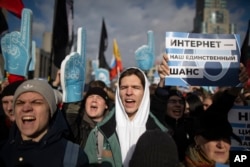The lower chamber of Russia's parliament has passed in the third and final vote a controversial bill that critics say is part of efforts by President Vladimir Putin to expand government control over the internet.
Lawmakers in the State Duma on April 16 voted 307 to 68 to pass the proposed legislation that critics fear could herald a new era of widespread censorship.
The second reading is when amendments are finalized. The bill must now go to the upper house, the Federation Council, before being signed into law by Putin.
The so-called "sovereign Internet" bill would require Russian web traffic and data to be rerouted through points controlled by the state, and for the creation of a domestic domain-name system.
Backers of the bill say it will make what they call the Russian segment of the Internet -- known as the RuNet -- more independent. They argue it is needed to guard Russia against potential cyberattacks.
Critics say the bill will deal a large blow to Internet freedom in Russia. The proposed move sparked protests of several thousand people in Moscow last month.
The legislation would require the installation of specialized equipment that would make it easier to block websites banned by the government with greater efficiency.
Last week, the chief of Russian media regulator Roskomnadzor said the bill would in fact target a popular messaging app.
Aleksandr Zharov told the TASS news agency on April 9 that the bill "prevents the spread of banned information."
"It's obvious that one of the elements of this prevention will be fighting against" online resources including the Telegram messaging app, Zharov was quoted as saying.
At least four online news outlets, including the Rossiiskaya Gazeta government daily, deleted his remarks, according to a Telegram channel monitoring efforts by Roskomnadzor to block the messaging app.
In April 2018, Russia blocked Telegram after the popular messaging app refused to comply with a Russian court order to give security services access to users' encrypted messages.
Amnesty International said that blocking Telegram - used by senior government officials and Kremlin foes alike - would be "the latest in a series of attacks on online freedom of expression" in Russia.
Many Russians took to the streets to protest Kremlin efforts to silence the messaging app.
(Some information for this report came from Reuters)

